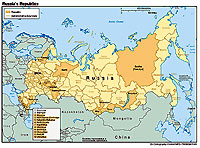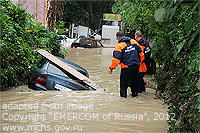Polling on Russian Political Figures, Election Fraud, Corruption, other problems facing Russia; Urban/Regional Split
7.10.12 - JRL 2012-124
![]()
Kommersant - July 10, 2012 - SPECIFIC METROPOLITAN OPINION: Moscow respondents are known for their critical attitude to the authorities; Opinion poll showed: there is a gap in relation to the authorities and to the public significant issues between Moscow and other regions of Russia - by Maxim Ivanov, Sophia Samokhina

Kommersant reports that AP commissioned
GfK Group to conduct a poll across Russia in late May and early June, 2012.
Results covered -- approval or disapproval for President Vladimir Putin, Prime Minister Dmitry Medvedev, Communist Gennady Zyuganov and Blogger Alexei Navalny; views on the falsification of elections, and severity of concern over corruption, terrorism, pollution, poverty and unemployment.
POLITICAL RATINGS
President Vladimir Putin got 60% positive ratings (to varying degrees), 14% are negative, and 26% of Russians are indifferent.
Regional Variations: Putin
But in Moscow, only 38% "sympathize with" Putin and 20% disapprove of him.
In the Caucasus Putin's support is 67.5%
Regional Variations: Medvedev
Similarly, Premier Dmitry Medvedev has 51.5% of respondents sympathetic to him nationwide, while in Moscow only 35%.
Again, the highest support for Medvedev in the Caucasus, at
65%.
Opposition: Zyganov and Navalny
Communist Gennady Zyuganov got an 18% positive rating, 23% in the Urals and Siberia, and only 14% in Moscow.
Blogger Alexei Navalny had 7% "support" nationwide and 43% nationwide do not know of him. Navalny has an 11% positive rating in Moscow, where 31% do not like him and 44% are indifferent. [So apparently Navalny has slightly higher support in Moscow, and perhaps more name recognition; but see further below about internet vs. television.]
The head of the Russian division of GfK indications selections were influenced by whether respondents also had "Western" preferences.
PROBLEMS FACING RUSSIANS
The following percentages believe the following concerns are serious problems:
Election Fraud - 56% in Moscow, and 38% nationwide
Corruption - 91% in Moscow, 85% nationwide
Terrorism - 80% in Moscow, 63% nationwide
Poverty - 75% in Muscow, 69% nationwide
Pollution - 87% in Moscow, 79% nationwide ). One of the rare problems that worries
Muscovites less than on average in the country is unemployment.
Unemployment - worries Muscovites less than Russians elsewhere (numbers not provided by article)
INTERNET VS. TELEVISION
The polling outfit also indicates a division has been developing between "Russia on
TV" and "Internet-Russia", with "Russia-TV" best represented in the provinces, and "Internet-Russia best represented in Moscow.
"Internet-Russia" is expanding, however.
POLITICAL AWARENESS
The article also quoted sociologist Lev Gudkov arguing that Russia in general is passive and not interested in politics, also pointing out that Putin's rating is still high.
United Russia party official and Duma deputy Sergey Zheleznyak argues that major cities have the concentration of "all the problems of the agenda" and are more politicized.
Meanwhile, Communist Party official Sergey Obukhov suggests that people in regions are "marginalizing", and have no time to think about corruption and fraud.
[no direct link available to English-language version of Kommersant article]
Keywords: Russia, Government, Politics - Russian News - Russia
![]()
Nezavisimaya Gazeta -
July 9, 2012
Report by Aleksey Gorbachev, Mikhail Sergeyev, and Mariya Bondarenko, "The Mystery of the Wave -- The Victims of the Flood in Kuban Do Not Believe That the Disaster Was Natural"

Covering recent flooding in southern Russia, Nezavisimaya Gazeta reports that witnesses described a "shock wave" of water seven meters high, causing doubts that the cause of the flooding was entirely natural in origin. Some suspect an imprudent discharge of water from a reservoir. Citizens also fault government officials for not doing more to evacuate residents or provide advance warning.
Hundreds died in Krymsk alone.
The reporters write, of local concerns:
The rain might cause the river to flood but it cannot suddenly produce a shock wave that according to witnesses' estimate reached 7 meters in height. Regardless of the admonishments of top officials, the victims are certain that the water hit Krymsk at night from the reservoir. At this point it is difficult to explain how and why rain water came together into a powerful tsunami. By the way, the officials themselves knew of the danger of flooding, according to them. Today they are saying that they warned the residents of the coming trouble. But the residents of Krymsk who are left alive say that there were no warnings of the coming trouble. At the same time, all it would have taken to organize an alarm would be to in advance turn on the sirens in the city -- if not stationary ones at least the ordinary signals on official vehicles of the MVD (Ministry of Internal Affairs), the administration, and other emergency services.
Officials claimed such a discharge was not possible, at least one calling the notion "insane" or "stupid," and allegedly demanding internet discussion of the theories cease. Te government argued that a cyclone formed over the Sea of Ahoz, causing enormous rainfall. The government indicates that the rain alone accounted for swollen river leading to flooding.
On the other hand, a dam in question apparently does have emergency discharge capabilities, when waters are high enough to pose the prospect of overtopping the dam.
Criminal Proceedings
And the SKR Administration for Krasnodar Kray reportedly has opened criminal proceedings based on evidence of the death of many people, under Part 3 of Article 109 of the Russian Federation Criminal Code -- death caused by the negligence of two or more persons.
Television vs. Internet
Russian television is reporting on the flooding and resulting deaths as a tragic event, but nevertheless a natural disaster, while the internet is raising questions of wrongdoing:
While the federal television channels are reporting on what happened as a tragic but perfectly ordinary event on a regional scale, the Russian Internet seethes with indignation. Social networks are full of comments by witnesses with a common appeal: "Don't believe the mass media!" The post by Yuliya Andropova, a resident of Krymsk, gathered enormous popularity; her page was later removed and the girl herself supposedly began to receive threats against her from unknown persons. That served as grounds for rumors of Internet censorship of the consequences of the flooding. Andropova assumes that the flooding of Krymsk is associated with attempts to protect Novorossiysk from mountain streams. "But in the end even Novorossiysk was not saved and Krymsk was drowned! But at least in that case people would have been warned that the reservoir would be let out on them -- but no such luck! Why weren't the police sent out to warn people? Why weren't the sirens turned on so that people would wake up?" The resident writes that there are no longer places in the morgue and all day Saturday the bodies of those who had drowned were floating in the street.
At the same time, individual internet users have raised questions about advance actions by officials or other parties:
Yuriy Tselikov, another user of the social network VKontakte, echoes her: "Don't believe the mass media! When the water level fell, we saw a horrible picture. The dead lay in ditches on the sides of the road, for the most part old people and children. The authorities did nothing at all from 0300 hours in the morning to 2100 hours the night of the flooding." Tselikov emphasizes that for three days MChS associates were inspecting the channel of the Agadum River that flows nearby; in other words, they knew that it would happen.
According to one blogger, the owners of the Neberdzhay Reservoir include officials of VEB (Foreign Economic Bank) and the Federal Service for Ecological, Technological, and Atomic Oversight, which was supposed to maintain the safety of reservoirs.
Assistance for Victims
Putin reportedly has promised assistance for victims: every family that suffered from the disaster will receive 10,000 rubles (R) for urgent needs, and later R50,000 from the regional budget per family member compensation for property lost, and R100,000 from the federal budget.
Families suffering deaths will receive R1 million from the federal budget and R1 million from the regional budget.
There also is to be reconstruction, but Putin has indicated the area is dangerous, and reconstruction should not occur in the same locations.